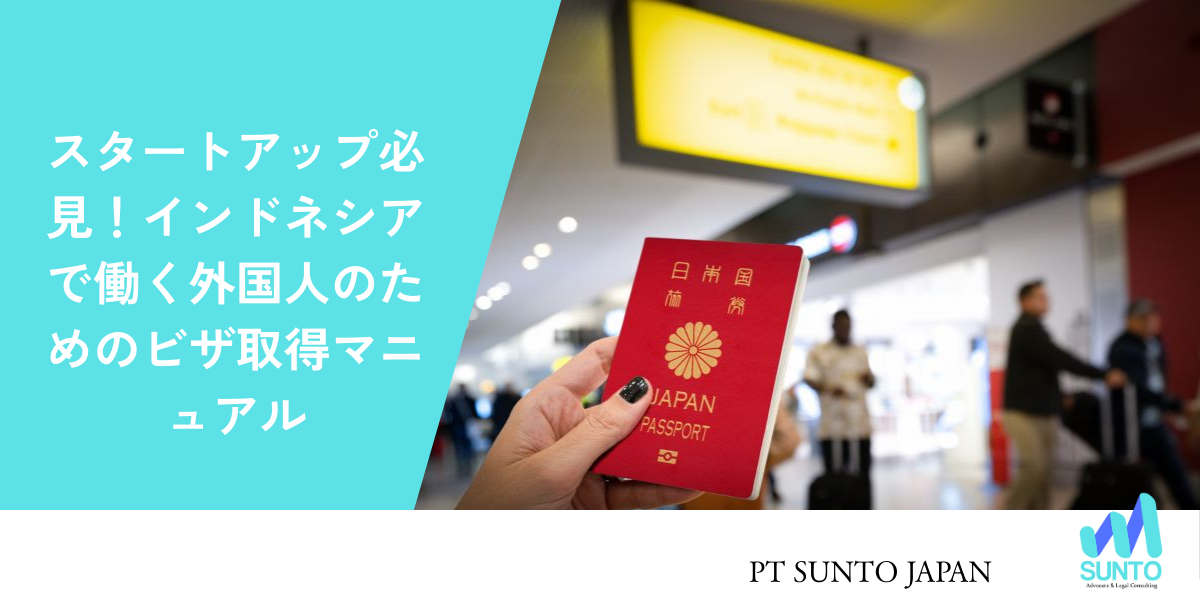

Indonesia, with its dynamic business opportunities and rich culture, has become an attractive business location for many foreigners in recent years. This large market holds significant potential, especially for startups. However, to successfully work in Indonesia, obtaining a visa and work permit is unavoidable. Both are essential for working legally in Indonesia, and many people are confused by the complicated process.
This article is intended for those considering moving to or working in Indonesia. It provides a comprehensive explanation of the relationship between visas and work permits, the process for obtaining them, and basic information based on Indonesian law and key points to note.
Visa vs. Work Permit: What's the Difference?

In Indonesia, rental contracts are generally made in writing. Oral agreements can cause problems, so be sure to sign the contract.
The Importance of Legal Aspects
First, let's clarify the difference between a visa and a work permit, which is often confusing to many people.
Bilingual Contracts: In many cases, when Japanese citizens enter into rental agreements, the contract is drafted in both Indonesian and English (or Japanese). In this case, the contract must be written in both languages.
Visa:
This is a visa that allows you to enter Indonesia. There are various types of visas, depending on your purpose of entry, such as tourism, business, work, and study abroad. If you plan to work, you will usually obtain a "Temporary Stay Visa (VITAS)." This visa is simply permission to "enter" Indonesia, and you cannot work legally with it alone. If you apply for a visa online, be wary of fake websites. Please apply through the official Indonesian government website.
Work Permit:
This permit allows someone to work in certain positions in Indonesia. Legally, this permit is considered a de facto work permit with the approval of the "Foreign Worker Utilization Plan (RPTKA)" and "Foreign Worker Utilization Compensation (DKPTKA)". This permit is issued by the Indonesian Ministry of Manpower. However, government agencies, representative organizations of foreign governments, international organizations, social organizations, religious organizations, and certain educational institutions are not required to pay the Foreign Worker Compensation Payment (DKPTKA), as stipulated in Article 47 of Law Number 6 concerning Job Creation and Article 35 paragraph (2) of the Regulation of the Minister of Manpower of the Republic of Indonesia Number 8 of 2021 concerning the Implementing Regulations of Government Regulation Number 34 of 2021 concerning the Utilization of Foreign Workers. In other words, to work legally in Indonesia, you need a visa (entry permit) and a work permit (work permit). Generally, the visa application is submitted by the employer (company), and the work permit process is carried out after entry. Provisions regarding foreign workers are regulated in Law Number 6 concerning Job Creation, Government Regulation Number 34 of 2021 concerning the Use of Foreign Workers, and Regulation of the Minister of Manpower of the Republic of Indonesia Number 8 concerning Implementing Regulations of Government Regulation Number 34 of 2021 concerning the Use of Foreign Workers.
Demystifying the Complicated Process: 3 Steps to Getting a Visa
Obtaining a work visa in Indonesia is a complex process involving many government agencies, but broadly speaking, it involves three steps:
Step 1: Obtain a Foreign Worker Utilization Plan (RPTKA)
This is the first step in obtaining a work permit, and it involves the employer (Indonesian company) submitting a work plan for employing foreign workers to the Ministry of Manpower for approval. This plan details the names, positions, job descriptions, length of service, etc. of the foreign workers to be hired. If the RPTKA is not approved, you cannot proceed with the visa process. The RPTKA is submitted online. To protect employment opportunities for Indonesian workers, authorities restrict the use of foreign workers to certain jobs and positions (for example, human resources). The skills, length of service, and educational background of the foreign workers will also be reviewed. Click here for more information.
Step 2: Apply for a Temporary Resident Visa (VITAS)
Once the RPTKA is approved, the employer will submit an application for a Limited Stay Visa for Foreign Workers (VITAS) to the Directorate General of Immigration, which is a prerequisite for obtaining a long-term residence and work permit in Indonesia. Previously, the visa stamp had to be obtained at an Indonesian diplomatic mission (Embassy or Consulate General of the Republic of Indonesia) abroad. However, now, in many cases, electronic visas (e-Visas) are issued online. These e-Visas will be sent to the applicant's email address and can be presented upon entry for immigration inspection.
Step 3: Obtain a Temporary Stay Permit (ITAS)
After entering Indonesia with a VITAS, foreign workers must immediately apply for a Temporary Stay Permit (ITAS) at the Immigration Office. Previously, this process involved stamping the passport, but electronic ITAS is now standard. Only after the ITAS is issued can they legally stay and work for an extended period. The ITAS application process must be completed within 30 days of arrival. This process requires documents such as the original passport, a photocopy of the VITAS, and an employment contract.
Work permits: costs borne by the employer
Regarding work permits, companies employing foreign workers are required to pay the Foreign Worker Utilization Compensation (DKPTKA), an advance payment of USD 100 per foreign worker per month to the government. This levy is used to fund skills development and vocational training programs for Indonesian workers.
These costs are generally borne by the employer and are not paid directly by the foreign worker. It's best to check this point when signing the employment contract.
Important things to know
The visa and work permit application process in Indonesia is constantly changing according to laws and regulations. Therefore, it's important to pay attention to the following points. For complete steps, please click here.
Consult an expert:
If you are unfamiliar with the laws and procedures, we recommend seeking the assistance of a local expert (a visa consultant or law firm) who will be up-to-date and can help you navigate the process smoothly.
Passport Expiration Date:
When applying for a visa, your passport must be valid for at least six months, although depending on the length of your work visa, you may be required to have a longer validity period.
Medical/Criminal Record Check:
When applying for a visa, you may be asked to submit a medical certificate and/or proof that you have no criminal record, so it's best to prepare in advance.
Spouse/Accompanying Family:
Foreign workers who have obtained a work visa may bring their spouse and minor children, but they will need to apply for separate visas (VITAS) and residence permits (ITAS) for their family members.
Employment and Education:
Employment for foreign workers tends to be limited to jobs that require specialized skills and knowledge, and may require a university degree or higher and a certain period of work experience in a related field.
Working in Indonesia can be a major leap in your career, but it starts with knowing the right visa and work permit information and following the proper procedures.
We hope this guide will help you start your new life in Indonesia. Don't be intimidated by the complex procedures, and build a great career and life in Indonesia.